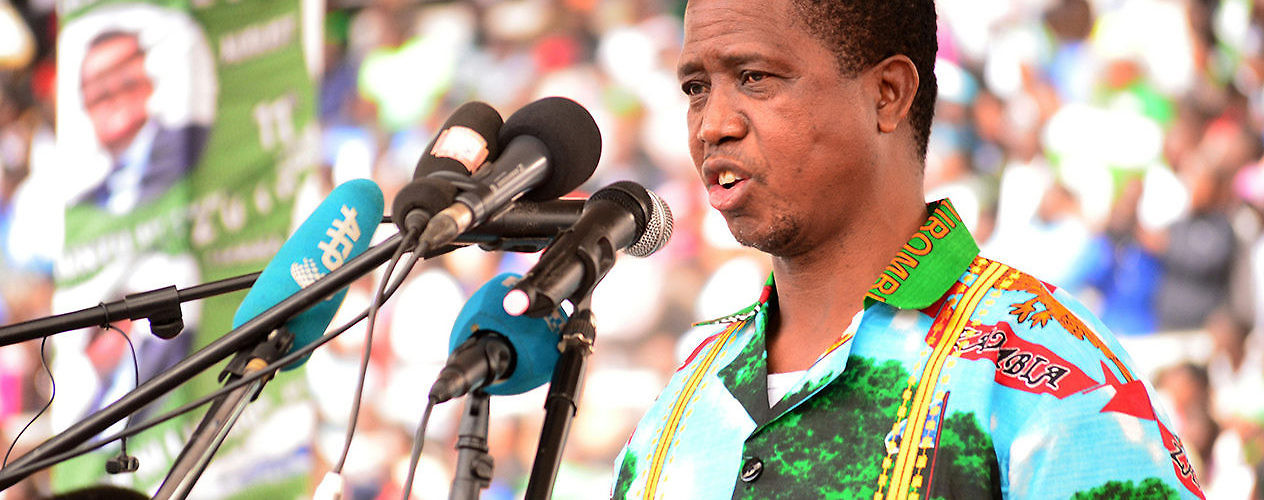Incumbent Zambian President Edgar Lungu addresses supporters ahead of the country's election. Lusaka, Zambia, May 21, 2016. (Salim Dawood/AFP/Getty Images)
Since transitioning to multiparty democracy in 1991, Zambia has enjoyed a fair degree of political stability. Elections, considered the cornerstone of any flourishing democracy, have been particularly trouble-free in a region where ballots are often cast amid the threat of bullets. This could now be at risk as the country heads into a tightly contested general election on August 11.
Zambia’s political progress was highlighted when Michael Sata unseated President Rupiah Banda in the country’s 2011 elections, which resulted in an unprecedented and peaceful transfer of power from a serving president to an opposition leader. Sata’s death in October 2014, however, ushered in a period of relative instability, with disputes regarding his successor causing fractures in the now ruling Patriotic Front party.
A by-election between the Patriotic Front’s Edgar Lungu and United Party for National Development leader Hakainde Hichilema went down to the wire, with a mere 1.66% of the vote splitting the presidential aspirants. Despite concerns regarding the conduct of the vote, Hichilema urged his supporters to remain calm and eventually conceded defeat.
Lungu and Hichilema are now set to square off again in what is anticipated to be another very close election. Running concurrent with the poll is a constitutional referendum on proposed amendments to Zambia’s bill of rights and the existing procedure for amending the national constitution. With claims of electoral malfeasance still fresh in the minds of many opposition activists and a markedly violent pre-election period, Zambia’s pluralist democracy may be facing its sternest test. Commencing in May this year, the campaign has seen many gatherings and events marked by increasing levels of violence. This has included political assassinations and the forcible dispersal and intimidation of supporters. Violence has become so routine that the Electoral Commission of Zambia suspended all campaign events in early July.
Much of the violence has been attributed to the Patriotic Front, including through its supporters and the state security apparatus, raising concerns that the election result will be influenced by a climate of intimidation. This has added to claims from Hichilema and others that the electoral process itself lacks transparency and is being manipulated to ensure victory for Lungu and his party.
The allegations are not without merit. The credibility of the electoral process has been called into question by the Electoral Commission’s controversial decision to award the contract for the printing of ballot papers to the Al Ghurairi Printing and Publishing company. Although the Dubai-based firm has a recent history of providing this service in elections such as the recent poll in Uganda, its bid was costed at double that of a South African company that has an established relationship with the commission. The decision was investigated by the Zambia Public Procurement Authority—a move which drew criticism from the Patriotic Front—but Al Ghurairi was nonetheless awarded the contract, pointing to possible collusion between these agencies and the ruling party.
In May, the Lungu administration also put forward a controversial electoral bill, which was passed shortly before the dissolution of the Zambian parliament. Among other things, it proposed that Electoral Commission officials be immune from prosecution for actions undertaken in the execution of their duties. It also allowed the president to sack members of the electoral body unilaterally. The legislation followed Lungu’s replacement of the organization’s respected commissioner Irene Mambilima with her deputy.
Zambia’s political tensions were further heightened following the June 2016 leaking of an alleged Patriotic Front manifesto detailing exactly how it planned to rig the upcoming vote. Released by public watchdog Open Zambia, the document detailed the alleged state capture of the Electoral Commission and proposed measures such as using the armed forces to intimidate and detain opposition polling agents; influencing the counting process; and manipulating the voter roll. The document included the names and contact details of PF and government agents responsible for each phase of the subversive campaign plan. The Zambian Watchdog group, meanwhile, reportedly uncovered a plot in which Lungu would deploy military personnel to strategic locations in the capital Lusaka to arrest key opposition figures if the PF loses the vote.
While the veracity of these accusations remains to be proven, Zambia’s elections will be held in a climate in which electoral irregularities and violence and intimidation are expected to be the norm. This could deny Hichilema and the United Party for National Development a fair opportunity to form government and could tarnish Lungu and the Patriotic Front should they be victorious.
Hichilema amicably conceded defeat in 2014, but a similar reaction this time around appears unlikely. One certainty, however, is that Zambia’s near three-decade run of democratic progress is under serious threat.





